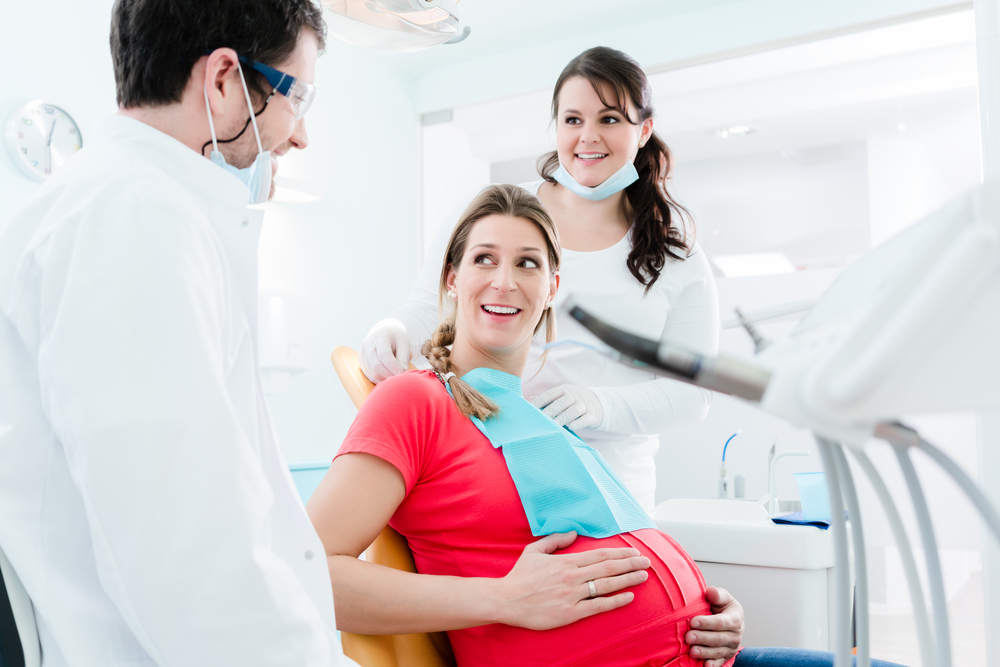
Dentleon İzmir Bornova, Çiğli, Güzelbahçe, Bayraklı Özel Diş Kliniği
How is Dental Treatment Done While Pregnant?
22 September 2025

Table of Contents
How is Dental Treatment Done While Pregnant?
What are the Effects of Pregnancy on Dental Health?
What Dental Problems Can Occur During Pregnancy?
What are the Dental Treatments That Can Be Done During Pregnancy?
Which Dental Treatments Are Not Performed During Pregnancy?
What Should Be Considered in Oral and Dental Care During Pregnancy?
Frequently Asked Questions About Dental Treatment During Pregnancy
Is tartar cleaning harmful during pregnancy?
Can Emergency Tooth Extraction Be Performed?
How is Dental Treatment Done While Pregnant?
What are the Effects of Pregnancy on Dental Health?
The pregnancy process directly affects not only the development of the baby but also the general health of the expectant mother. Changes in hormone levels during this period, especially the increase in estrogen and progesterone hormones, make teeth and gums more sensitive. As a result:
- Bleeding gums are more common.
- Redness , swelling, and tenderness of the gums may occur.
- Gum tissues can become inflamed more easily.
In addition, nausea and vomiting complaints, which are common during pregnancy, cause stomach acid to reach the mouth. This condition makes the oral environment acidic, leading to erosion of tooth enamel and an increased risk of cavities.
Another significant impact is the shift in dietary habits. Increased cravings for sweets during pregnancy can lead to higher consumption of sugary foods. Without regular dental cleaning, this accelerates the formation of cavities.
What Dental Problems Can Occur During Pregnancy?
The main dental and gum problems that can be seen during pregnancy are:
- Gum swelling: Edema may develop in the gums due to hormonal changes. This causes bleeding while brushing teeth.
- Gum recession: Inflamed and weakened gums can expose tooth roots over time. This creates sensitivity in the teeth.
- Toothache: Both the progression of existing cavities and newly occurring dental problems can increase toothache during pregnancy.
- Tooth decay: Frequent snacking, tendency to sugary foods and increased acidic environment seriously increase the risk of cavities.
- Tooth fracture: Weakened tooth enamel and increased cavities can cause teeth to break more easily.
- Pregnancy gingivitis: It is a condition that starts especially from the 2nd and 3rd months of pregnancy and manifests itself with gum swelling, redness and bleeding. If left untreated, periodontitis (advanced gum diseases) may develop.
What are the Dental Treatments That Can Be Done During Pregnancy?
Dental treatments are not completely prohibited during pregnancy. However, procedures that will not harm the health of the mother and baby and are considered safe should be preferred. Especially the 2nd trimester (4th – 6th months of pregnancy) is considered the most suitable period for dental treatments. The main treatments that can be done during this period are:
- Tartar cleaning: It can be done regularly to maintain gum health. However, the procedure must be performed under the control of a specialist dentist and gently.
- Filling treatment: If new cavities have formed or old fillings are causing problems, fillings can be made with appropriate materials. In this way, the risk of toothache and infection is prevented.
- Root canal treatment: Root canal treatment can be applied with local anesthesia when necessary in teeth that cause severe pain or inflammation. The drugs to be used should be selected according to pregnancy.
- Emergency tooth extraction: Teeth that cause severe pain or inflammation can be safely extracted with antibiotic treatment. Extracting teeth, especially those at risk of abscess, is beneficial for the health of both mother and baby.
Which Dental Treatments Are Not Performed During Pregnancy?
Although some procedures are safe, there are treatments that should be postponed if possible during pregnancy. These procedures are usually aesthetic or long-term surgical operations.
- Implant treatment: It is generally not recommended during pregnancy as it requires local surgery. Therefore, it is recommended to leave it until after birth. For detailed information, you can review our implant treatment page.
- Orthodontic treatments (braces or plaque applications): Since it does not constitute an urgent necessity during pregnancy, it is more appropriate to postpone it to the period after birth.
- Aesthetic procedures (teeth whitening, porcelain veneers, etc.): It is recommended to leave it until after birth as there is no urgent need for health.
- Long-term surgical operations: Extensive and long-lasting procedures such as jaw surgery are not suitable for pregnancy.
What Should Be Considered in Oral and Dental Care During Pregnancy?
Maintaining oral and dental health during pregnancy is very important for both mother and baby. Because tooth and gum problems that occur during this process can affect the general health of the mother as well as indirectly affect the development of the baby. The main points to note are:
- Brushing teeth at least 2 times a day:
Regular brushing prevents tooth decay and gingivitis. Since the gums are more sensitive during pregnancy, a soft-bristled brush should be preferred. - Using dental floss:
Since the toothbrush cannot reach every area, flossing is essential to clean plaque and food residues, especially on the interfaces. In this way, gingivitis can be prevented. - Choosing fluoride toothpaste: Fluoride
strengthens tooth enamel and prevents the formation of cavities. Since enamel can weaken due to the increased acidic environment during pregnancy, the use of fluoride paste provides extra protection. - Avoiding sugary foods:
Frequently consumed sugary foods and drinks increase the risk of cavities. In addition, the acidic environment after nausea during pregnancy, combined with sugar, can cause more damage to the teeth. - Regular dental check-ups:
It is recommended to go to the dentist at least 1-2 times during pregnancy. Thus, problems that may occur can be diagnosed early and treated safely for both mother and baby.
Frequently Asked Questions About Dental Treatment During Pregnancy
Is tartar cleaning harmful during pregnancy?
Tartar cleaning during pregnancy is generally not harmful when performed by a specialist dentist. On the contrary, cleaning tartar is very important to maintain gum health. Because tartar can cause inflammation and bleeding.
- First trimester (1st trimester): It is the period when the baby’s organ development is most intense. Therefore, non-essential treatments are often postponed.
- Second trimester (2nd trimester): This is the most suitable period for tartar cleaning. It is the safest process for both mother and baby.
- Third trimester (3rd trimester): Long-term procedures may disturb the expectant mother. In this period, simple cleaning processes are preferred, except in compulsory cases.
Can Emergency Tooth Extraction Be Performed?
If the expectant mother’s toothache is very severe and needs to be treated, emergency tooth extraction can be performed with appropriate local anesthesia. However, this procedure must be performed with the joint decision of the obstetrician and dentist.
In conclusion, dental treatment during pregnancy can be safe for mother and baby when done at the right time and with the right method. Dental problems experienced during this period should not be neglected and regular check-ups should not be interrupted.
Recent Posts



